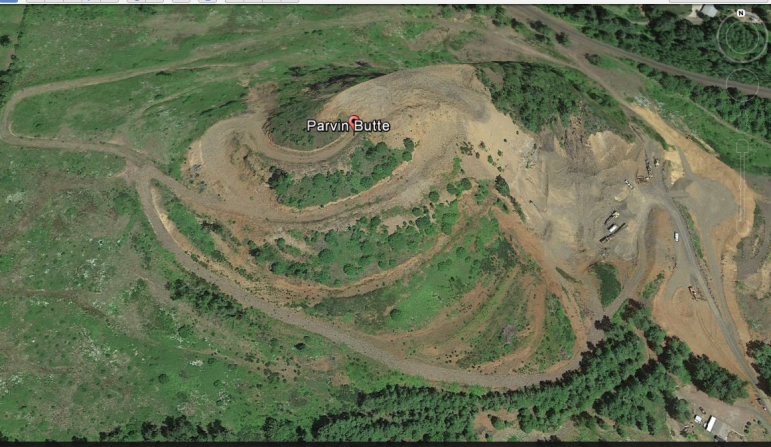For more than four decades, 82-year-old Howard Purkerson carefully managed his timberland in Crow, Oregon, choosing to selectively thin the 90-acre forest instead of toppling it in a more profitable clearcut. But now almost all of the trees are gone. And Purkerson is furious.
“I didn’t want some logging company coming in and raping this beautiful parcel,” he told InvestigateWest. “If there was any way I could balance the scales, I would do it.”
Purkerson refused to sell to Lane County land developers Greg Demers, Normal McDougal and Melvin McDougal because he had heard of their well-publicized clearcutting and mining at Parvin Butte, their burning Pilot Rock landfill (which earned Demers a $792,062 state environmental fine) and their efforts to obtain McKenzie River water rights that an administrative law judge denied as water speculation.
According to Purkerson and several other forest landowners, Demers and the McDougals use a variety of means to get what they want, sometimes pushing the envelope, when it comes to buying and harvesting timberland in Oregon. But state forestry officials are nearly powerless to stop them, InvestigateWest has learned — even when they run afoul of the law.
Purkerson says that when Demers in 2013 asked about buying the timberland, “I told [Demers] I wouldn’t sell it to him for any price,” he said.
But somehow the McDougals got Purkerson’s land anyway. Shortly after rebuffing Demers, Purkerson says he received an offer on the property from Daniel Bell, the co-owner of a hair salon in Coburg. Bell, who indicated that he wanted to live on the property, promised to keep the forest standing, Purkerson says.
But that didn’t happen. According to county property records, Bell sold the land only two months later for $10,000 more than the purchase price. The buyer: McDougal Bros. Inc., the investment firm owned by Norman and Melvin McDougal. Within months, the forest was gone. Purkerson claims he was tricked, believing Bell was just an operative of Demers and McDougal.
“He came here with a six-pack of beer and some jerky and was just all nicey-nicey, you know?” Purkerson said. “At my age I should have known better. It was dumb, but I sold it.”
In a phone interview, Bell declined to comment on the circumstances surrounding his purchase. Asked whether he was employed by McDougal Bros., Bell said: “I do not presently have any relationship with Greg Demers or the McDougal brothers.” He declined to elaborate for this story.
Demers and the McDougals did not respond to repeated requests for an interview. But amid their silence, other forest landowners in Oregon shared similar regrets about their encounters with the trio.
One such landowner is Delbert Erb of Albany, who signed a timber contract with Demers and Oregon Land Company, or OLC, in July 2014.
According to Erb and his neighbor Mike Stipp, a self-trained forester who helped Erb monitor the logging operation on Erb’s land, the loggers flouted the Forest Practices Act from the very start. And documents from the Oregon Department of Forestry back them up.
On Oct. 29th, 2014, after Erb filed a complaint about an inadequate culvert that created a heightened flood risk, ODF issued two identical citations to a pair of subcontractors: ATR Services Inc., which is run by Demers and his brother Jeff Demers, and Rose Logging Inc., which has family ties to McDougal Bros.
Two months later, ODF officials returned for another inspection of the logging site, and once again they found damage caused by the same loggers. On Jan. 5, officials from ODF documented evidence of soil disruption and inadequate stream protection on Erb’s property, but they decided that the issues didn’t warrant formal citations. Instead, ODF issued a notice of “unsatisfactory conditions” and allowed the logging contractors to fix the problems without penalty. Such notices often precede a formal citation, an ODF official said, and the contractors fixed the problems before a violation occurred.
Stipp contends that ODF should have come down harder on the loggers. In December, Stipp took video footage of what he says appear to be oil slicks, tire ruts, and other signs of damage to Erb’s property that would violate the Forest Practices Act. None of those alleged violations resulted in citations or fines.
“They just try to take advantage of you until you make them stop,” Stipp says, referring to Demers and the McDougals. “Not all loggers do what these guys did. Not all of them are bad.”
Demers and his companies have been cited by ODF at least seven times in the last three years alone, with additional violations dating as far back as 1987.
Melvin and Norman McDougal were not named in the state’s database of forestry citations, a state public-records request showed. However, sometimes they hire subcontractors to do their logging work. For example, although inspection reports indicate that McDougal Bros. owned the timber on Erb’s property, it was the subcontractors Rose Logging and ATR Services that received the citations.
Rules without teeth
In Oregon, ODF generally requires logging companies that break the forestry rules to repair damages and pay a fine. But those fines rarely amount to more than a slap on the wrist. Under state law, ODF cannot issue a penalty larger than $5,000 per violation, even to repeat offenders.
“When we do enforce the law, our goal is to educate folks,” said Angie Lane, ODF’s civil penalties administrator. “The Forest Practices Act puts a lot of responsibility on the landowner and the logging operator to do a good job.”
But when loggers don’t do a good job, Oregon’s $5,000 cap on fines gives ODF less leverage than other state agencies to crack down on offenders like Demers. The Department of Environmental Quality, for example, slapped Demers with a $792,062 penalty for failing to clean up an abandoned lumber dump in eastern Oregon, where fires regularly break out during the summer and blanket the town of Pilot Rock in smoke. (That fine remains under appeal, but in the most recent decision, issued in November, the Environmental Quality Commission ruled that Demers must pay.)
Oregon also has fewer safeguards than its southern neighbor, California, to prevent logging violations before they happen. In California, logging contractors must be licensed by a state agency, and they must also file detailed timber harvesting plans, which are subject to public review and comment for more than a month before a cut is approved. Washington employs a public review process similar to California’s.
In Oregon, loggers are similarly required to notify the state forester before logging trees. But complete harvesting plans are only required in certain circumstances, and there is no public review process. Also unlike California, logging companies in Oregon don’t need a state logging license.
That leaves forest landowners with little protection when unscrupulous loggers purchase timberland or logging rights.
Forest landowners should ask for and check references of logging companies with which they do business, Lane said. Talking with other forest landowners will help protect those doing business with a logging contractor.
“It’s really a ‘buyer-beware’ situation here in Oregon,” Lane said. “Before you hire a logging contractor under some sort of contract, you should do some reference checking.”
‘Outside our jurisdiction’
Five years ago, in the midst of a divorce, Susie Hanner reluctantly prepared to sell her Creswell home and the idyllic 69-acre forest surrounding it. With assurances that the new owners would thin but not clearcut the plot’s mosaic of firs, oaks, and pines, Hanner agreed to sell the property to Fern Hollow Farms Inc., a company run by Greg Demers.
But when Hanner arrived to sign the paperwork, the contract listed a different buyer: McDougal Bros. Investments.
“I didn’t know until closing that I was selling to the McDougals,” Hanner said. “I panicked.”
Hanner says she had second thoughts about the sale, but having already put the house on the market once with no bites, she decided to move forward. “I wasn’t really excited about it,” she said. “But my Realtor reminded me they were not going to clearcut” — an account supported by emails Hanner provided to InvestigateWest.
But that verbal agreement turned out to be a false promise. Today, aerial images show that only a few small patches of trees remain on the property. The rest of the forest is gone.
Hanner still hasn’t forgiven the McDougals. When she saw one of the brothers at a public meeting about Parvin Butte, Hanner unloaded, she says. “I told him, ‘I would love to do to your genitalia what you did to my trees.’ I got a bit of very minute pleasure from seeing his reaction.”
According to Lane, ODF can’t get involved with land-sale disputes like Hanner’s, even those involving a breach of contract.
“That would be outside our jurisdiction,” Lane says. “The only thing we’re responsible for is violations of the Forest Practices Act. What happens when they buy land becomes a contractual issue between the landowner and the operator.”
Landowners can take contract disputes to court, but that can be daunting — and difficult — for small forest landowners like Erb.
Erb told InvestigateWest that the logging contractors, in addition to their documented forestry violations, also took more trees than outlined in his contract. To try to prove his case, Erb hired an independent timber consultant to complete a survey of the forestland — an assessment that found the loggers had exceeded their allotted cut by an estimated 200,000 board feet. This documentation might have helped Erb make his case in court, but it never came to that. Erb, who is 77, says he couldn’t afford to file a lawsuit.
Neither Demers nor the McDougals responded to repeated requests for comment. But state court records show that Demers has faced similar allegations before. In civil lawsuits filed more than 20 years ago, three separate landowners accused Demers of failing to follow through on his contract obligations. In one of the lawsuits, eventually settled out of court, the plaintiff alleged that Demers failed to pay for $45,000 worth of timber. According to the lawsuit, Demers had suggested to the landowner that his company, Timber Sales & Reforestation, was financially strong and in the process of building new offices. In reality, the complaint says, Demers’ company was insolvent.
Although ODF can’t intervene in such disputes, Lane says that resources do exist to help forest landowners navigate timber sales and contracts. The Oregon Association of Loggers website, for example, includes an eight-step guide to harvesting timber; Oregon State University runs a forestry extension program that helps support forest landowners; and the Oregon Forest Resources Institute (OFRI) invites questions through its “Ask a Forester” page, which covers forestry laws but not contract issues.
However, not all landowners know about those resources, and some don’t get results even when they use them. Stipp, for example, says he used OFRI’s “Ask a Forester” feature to submit a question about state forestry laws. The response? “I never heard back,” he says.
Lee van der Voo and Rosemary Camozzi contributed to this report.





“Washington employs a public review process similar to California’s.”
This is incorrect.